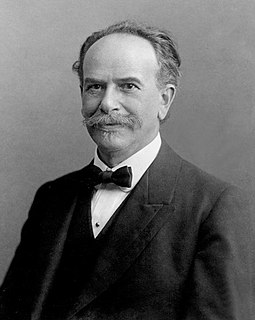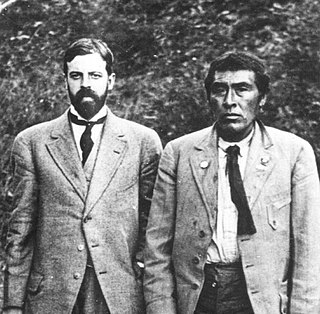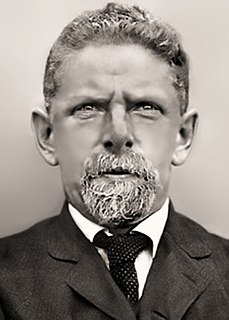Related Research Articles

Franz Uri Boas was a German-born American anthropologist and a pioneer of modern anthropology who has been called the "Father of American Anthropology". His work is associated with the movements known as historical particularism and cultural relativism.

John Wesley Powell was an American geologist, U.S. Army soldier, explorer of the American West, professor at Illinois Wesleyan University, and director of major scientific and cultural institutions. He is famous for his 1869 geographic expedition, a three-month river trip down the Green and Colorado rivers, including the first official U.S. government-sponsored passage through the Grand Canyon.

Stewart Culin was an American ethnographer and author interested in games, art and dress. Culin played a major role in the development of ethnography, first concentrating his efforts on studying the Asian-Americans workers in Philadelphia. His first published works were "The Practice of Medicine by the Chinese in America" and "China in America: A study in the social life of the Chinese in the eastern cities of the United States", both dated 1887. He believed that similarity in gaming demonstrated similarity and contact among cultures across the world.

Alfred Louis Kroeber was an American cultural anthropologist. He received his PhD under Franz Boas at Columbia University in 1901, the first doctorate in anthropology awarded by Columbia. He was also the first professor appointed to the Department of Anthropology at the University of California, Berkeley. He played an integral role in the early days of its Museum of Anthropology, where he served as director from 1909 through 1947. Kroeber provided detailed information about Ishi, the last surviving member of the Yahi people, whom he studied over a period of years. He was the father of the acclaimed novelist, poet, and writer of short stories Ursula K. Le Guin.

Clark David Wissler was an American anthropologist, ethnologist, and archaeologist.

John Reed Swanton was an American anthropologist, folklorist, and linguist who worked with Native American peoples throughout the United States. Swanton achieved recognition in the fields of ethnology and ethnohistory. He is particularly noted for his work with indigenous peoples of the Southeast and Pacific Northwest.
Robert Harry Lowie was an Austrian-born American anthropologist. An expert on North American Indians, he was instrumental in the development of modern anthropology and has been described as "one of the key figures in the history of anthropology".

William Henry Holmes, known as W.H. Holmes, was an American explorer, anthropologist, archaeologist, artist, scientific illustrator, cartographer, mountain climber, geologist and museum curator and director.

Frederic Ward Putnam was an American anthropologist and biologist.
The American Ethnological Society (AES) is the oldest professional anthropological association in the United States.

Vladimir Ilyich Jochelson was a Russian ethnographer and researcher of the indigenous peoples of the Russian North.
Jerald T. Milanich is an American anthropologist and archaeologist, specializing in Native American culture in Florida. He is Curator Emeritus of Archaeology at the Florida Museum of Natural History at the University of Florida in Gainesville; Adjunct Professor, Department of Anthropology, College of Arts and Sciences at the University of Florida; and Adjunct Professor, Center for Latin American Studies at the University of Florida. Milanich holds a Ph.D in anthropology from the University of Florida.
Frederick Russell Eggan was an American anthropologist best known for his innovative application of the principles of British social anthropology to the study of Native American tribes. He was the favorite student of the British social anthropologist A. R. Radcliffe-Brown during Radcliffe-Brown's years at the University of Chicago. His fieldwork was among Pueblo peoples in the southwestern U.S. Eggan later taught at Chicago himself. His students there included Sol Tax.
Frank Gouldsmith Speck was an American anthropologist and professor at the University of Pennsylvania, specializing in the Algonquian and Iroquoian peoples among the Eastern Woodland Native Americans of the United States and First Nations peoples of eastern boreal Canada.

Joseph Florimond, Duke of Loubat was a French and American bibliophile, antiquarian, sportsman, and philanthropist.
Frederick Webb Hodge was an American editor, anthropologist, archaeologist, and historian. Born in England, he immigrated at the age of seven with his family to Washington, DC. He was educated at American schools, and graduated from Cambridge College.

Nels Christian Nelson was a Danish-American archaeologist.
Daniel C. Swan is an American cultural anthropologist and museum curator whose work has focused on documenting and interpreting the cultural history of the Americas. He has specialized particularly on the histories, social organizations, and cultures of Native North American peoples in Oklahoma, USA. His research on the history, significance, and artistic forms of the Native American Church has led to research and exhibition collaborations with artists and elders in a diversity of American Indian communities, both in Oklahoma and elsewhere in the Western United States. In addition to his work on American Indian topics, he has organized exhibitions and museum catalogs about cultural diversity in the American West and in the Western Hemisphere more broadly.
Leslie Spier was an American anthropologist best known for his ethnographic studies of American Indians. He spent a great deal of his professional life as a teacher; he retired in 1955 and died in 1961.
C. Malcolm Watkins (1911–2001) was an American historian, archaeologist, and curator. He researched early American material culture, with a specific interest in the decorative arts. Watkins served as a head curator of the Department of Cultural History at the National Museum of American History at the Smithsonian Institution in Washington, D.C. He spent a total of 31 years working at the Smithsonian.
References
- "Among The Colleges ... Columbia." "New York Tribune" "December 30, 1895: 13 ("Two prizes, one of not less than $1000 and the other of not less than $400, will be awarded in 1898 to the authors of the best works on the history, geography, archeology, ethnology, philology or numismatics of North America. They are to be known as the Loubat Prizes, ...").
- "Awarded Loubat Prize - Dr. John R. Swanton Honored for Books on Indians." Evening Star (Washington, D.C.) May 11, 1913: 15 ("The prize, which carries with it $400, was founded in 1893 by the Duc de Loubat, formerly of New York City, but now a resident of Paris, to encourage researches in the history, geography, archeology, ethnology, philology or numismatics of North America.").
- "Mr. Holmes' Honors. Washington Scientist Receives An Important Prize." "Evening Star (Washington, D.C.) June 10, 1898:10 (“The award of the Le Duc de Loubat prizes, founded by Columbia College of New York, to be awarded one in five years, for the most noteworthy works in American anthropology, has been made, and the first grand prize of $1000 was captured by Mr. William Henry Holmes of Washington, head curator of anthropology at the United States National Museum, and formerly curator of the department of ethnology in the Field Museum in Chicago.”).
- "2 Awards Posthumous". New York Times 3 May 1953: 113.
- "Announce Loubat Prizes". New York Times 9 May 1918: 11.
- "He Is to Receive $1,000 of Columbia Loubat Prize". New York Times 27 May 1948: 26.
- "Literary Awards Made". New York Times 23 Sept. 1958: 30.
- "Loubat Prize Won by Dr. S. G. Morley". New York Times 20 Apr. 1943: 21.
- "March of Nations on Columbia Green". New York Times 7 Jun. 1923: 14.
- "Paullin and Wright Win Loubat Award". New York Times 11 Apr. 1933: 16.
- "Prof. S.E. Morison Wins Loubat Prize". New York Times 9 May 1938: 2.